
According to CBS 19, a former Nacogdoches ISD teacher is facing multiple sex crimes involving children. Annaleigh Andrews, 24, was taken into custody on Thursday, July 20, 2023. Andrews was a middle school teacher at McMichael Middle School located at 4330 SE Stallings Dr, Nacogdoches, TX 75961.
Not many details have been released by Andrews if facing charges including three counts each of improper relationship with a student, sexual assault, trafficking a child to engage in sexual conduct, and enticing a child, according to the Nacogdoches Police Department.

Sexual assault within educational institutions remains a distressing and deeply concerning issue that demands immediate attention and action. As allegations of misconduct by teachers continue to surface, it is vital to explore the legal avenues available to victims seeking justice and accountability. In this exclusive interview, we speak with Anjali Nigam, Esq., a respected sexual assault attorney based in Texas, to gain insights into the civil case options victims may pursue when sexually abused by a middle school teacher.
Darla Medina (DM): Thank you for joining us today, Anjali. It's essential to shed light on such a crucial topic. First and foremost, could you explain the legal options available to victims of sexual assault perpetrated by a teacher or educator?
Anjali Nigam (AN): Thank you, Darla. It's crucial to address this matter openly. Victims of sexual assault by teachers have the right to pursue both criminal and civil legal actions. The criminal case involves holding the offender accountable through the criminal justice system, while the civil case is focused on seeking compensation and justice for the victim through the civil courts.
DM: How does the civil case process differ from the criminal case process?
AN: In a criminal case, the state prosecutes the offender, seeking punishment in the form of imprisonment, probation, or fines. On the other hand, a civil case is brought by the victim against the perpetrator, and possibly the school district or administrators responsible for their supervision. The aim is to seek financial compensation for the harm caused by the assault and to hold those accountable responsible for their actions.
DM: What type of compensation can victims expect to receive through a successful civil case?
AN: Compensation, also known as damages, in civil cases can vary based on the extent of the harm suffered by the victim. It may include medical expenses, therapy costs, loss of income, pain and suffering, and emotional distress. In some cases, punitive damages might also be awarded to punish the wrongdoer and deter others from similar actions in the future.
DM: For victims who want to pursue a civil case, what steps should they take?
AN: First and foremost, the victim should prioritize their safety and well-being. Seeking medical attention and counseling is essential. Additionally, they should preserve any evidence related to the assault, such as messages, photos, or witnesses' contact information.
Once they are ready to pursue legal action, consulting an experienced sexual assault attorney is crucial. The attorney will guide them through the legal process, gather evidence, and represent their interests in court.
DM: How can educational institutions prevent such incidents from happening in the first place?
AN: Prevention is key, and educational institutions should implement robust policies and protocols to safeguard their students. This includes thorough background checks for potential employees, regular training for staff on recognizing and reporting signs of abuse and maintaining an environment where victims feel safe to come forward.
DM: Are there any specific challenges that victims might face in pursuing a civil case against a teacher or school district?
AN: Yes, there can be unique challenges. Victims, especially if they are students, might fear retaliation or not being believed by others. Additionally, cases against educational institutions can be complex due to the involvement of various legal and administrative entities. It's crucial for victims to have strong legal representation who can navigate through these complexities and protect their rights.
 info@legalherald.com
info@legalherald.com